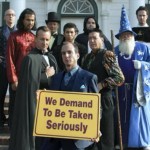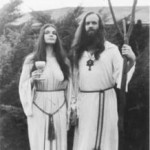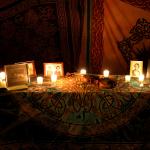In an excellent essay entitled, “The New Old Paganism”, Ronald Hutton reviews the history of “magic” as a concept among academicians. Starting with James Frazer, magic was defined in contradistinction to religion, the latter consisting of petitioning supernatural powers for favors and praising them, the former consisting of human manipulation of supernatural powers. Later, Ruth Benedict posited a continuum on which both religion and magic exist. Magic continued thereafter to be distinguished by “the concrete specificity of its goals, a manipulative attitude, [and] an instrumental character”. In 1970, Dorothy Hammond suggested that magic should be included within religion as one type of religious practice, and contrasted not with religion, but with prayer, sacrifice, etc.
Following Hammond, I offer the following tentative definitions which attempt to distinguish certain magico-religious practices based on whether the goal of the practice is to effect an objective change in the world or a subjective change in oneself. These are listed in an order the degree of their instrumental character. Those practices that seek only subjective change, as well as non-instrumental religious practices, are arguably not incompatible with modern science.
Forms of Magic that Purport to Effect Objective Change
“Practical magic”: Manipulation of supernatural forces to effect a change in the material universe. Like technology, magic is in essence, an imposition of human will on the natural world, the only difference being that supernatural, rather than natural, forces are used. As I explained in my previous post, by “supernatural”, I mean those forces which are not recognized by the natural sciences.
“Thaumaturgy”: Commanding divine powers or otherwise exerting human will over divinity in order to effect a change in the material universe; miracle working; using religious means to achieve magical (practical) ends.
“Supplication” (I): Petitioning divine powers to intercede on behalf of the petitioner to effect a change in the material universe. This may take the form of a pure request (i.e., prayer) or a proposal of an exchange (sacrifice, offering, vow, etc.).
Forms of Magic that Purport to Effect Objective OR Subjective Change
“Invocation”: Drawing down or inviting divinity or deity into oneself. This includes various forms of aspecting, assumption of godforms, and possession. According to Ronald Hutton, invocation, is the “central act of pagan witchcraft”. One might wonder why it is necessary to “invoke” a pantheistic Goddess that is already always present. The answer is that the early Wiccan Goddess was not conceived pantheistically. Graham Harvey tries to reconcile this discrepancy by explaining that “invocation allows that which is already immanent, innate and incarnate to be seen, revealed and experienced. […] The Goddess becomes manifestly obvious.” Thus, the Goddess, although present, was latent, and becomes manifest through “invocation”.
Forms of Magic that Purport to Effect Subjective Change
“Theurgy”: Commanding divine powers or otherwise exerting human will over divine powers in order to effect a spiritual change in the practitioner; using magical means to achieve religious ends.
“Supplication” (II): Petitioning divine powers to intercede on behalf of the petitioner to effect a change in the psychological or spiritual state of the practitioner, or a request for information (i.e., about the future; divination). This may take the form of a pure request (i.e., prayer) or a proposal of an exchange (sacrifice, offering, vow, etc.).
“Mysticism”: Techniques for achieving union with ultimate reality, with or without divine aid.
“Evocation”: Calling up the divine powers from within oneself, for the purpose of psychological integration or spiritual evolution. According to Ellwood and Partin, “Evocation, calling up the gods from within the self, is true magic.” Gordon Melton contrasts evocation and invocation: “The object of invocation is a mystical oneness with the gods, and invocation is the basis religious act common to almost all religious traditions. Evocation is a confrontation of the magician with the magical forces within him/herself.” The Wiccan “Charge of the Goddess” is the self-revelation of the Neopagan Goddess and is arguably the culmination of the Wiccan rite. In so far as it concludes the following declaration, “if that which you seek you find not within yourself, you will never find it without”, it implies that the Goddess is found within, not without, and that Wiccan “invocation” is really an “evocation”. The recognition of the divinity within is arguably the central insight of Neopaganism, as expressed in the greeting/mantra of the Church of All Worlds: “Thou Art God, Thou Art Goddess.”
“Consecration”: Drawing down or inviting divine powers to consecrate or sanctify (make sacred) a person, place, thing or time. According to Ronald Hutton, the quintessential action of modern paganism is “consecration, the treatment of people, places, and objects in such a way as to make them seem more spiritually powerful, effective, and significant.”
“Enchantment”: Techniques to achieve a transformation of consciousness to include an expanded awareness of our participation in or connection with the natural world. This is the sense in which Morris Berman wrote about “the re-enchantment of the world” and Thomas Moore writes about “the re-enchantment of everyday life”.
Forms of Magic(?) that Purport to Effect No Change
“Non-instrumental religious practices”: Religious practices that do not seek to effect any change, but seek to celebrate, praise, express devotion to, or awe or reverence of, or to heighten awareness of some aspect of the material or immaterial world. Examples include some forms of celebratory forms of paganism or hymns and prayers of praise, adoration, or devotion. It may be questionable to call these practices “magic” since they do not seek to change anything.
This schema is a work in progress. I welcome any thoughts.















